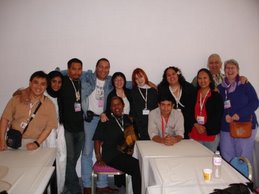The International Indigenous ICT Task Force was born in the context of the World Summit on the Information Society (WSIS).
WSIS was the first United Nations Summit that was convened in two phases. WSIS(1) took place from 10-12 December 2003 in Geneva and WSIS(2) from 16 to 18 November 2005 in Tunis.
Generally, WSIS aimed to ensure that the benefits of the Information Society, and particularly the Internet, are accessible to all while promoting specific advantages in areas such as e-commerce, e-governance, e-health, education, literacy, cultural diversity, gender equality, sustainable development and environmental protection.
Indigenous Peoples were involved in both WSIS phases. A small international Indigenous delegation under the umbrella of the Indigenous Media Network participated in a number of preparatory meetings to voice Indigenous concerns and aspirations, to work towards including them in the final Summit documents and to establish Indigenous Peoples as a stakeholder in the evolution of the Information Society. The Geneva and Tunis Summits themselves were accompanied by two larger parallel events on Indigenous Peoples and the Information Society, enabling a number of Indigenous representatives to become involved into the political WSIS process.
Due to the efforts of Indigenous Peoples, a special “Indigenous paragraph” was included in the Geneva WSIS Declaration of Principles (Art.15) and the Tunis Commitment (Art.22):
“In the evolution of the Information Society, particular attention must be given to the special situation of Indigenous peoples, as well as to the preservation of their heritage and their cultural legacy.”
This paragraph establishes Indigenous Peoples as a stakeholder in the WSIS process, its implementation and follow-up.
At the Tunisia phase of WSIS Indigenous delegates agreed to establish an Indigenous ICT Taskforce to continue the work of WSIS from an Indigenous point of view.
Cultural diversity in the Information Society, respect for and protection of traditional knowledge, the strengthening of Indigenous cultures and identities through ICTs and Indigenous connectivity should continue to be a focus for discussions at any number of international gatherings, including, but not limited to, the UN Permanent Forum, the UN Working Group on Indigenous Populations, and the Summit of the Americas.
A "Terms of Reference" was developed by the IITF to seek to guide the formulation of the international Indigenous ICT agenda, through communications which are open, transparent and culturally appropriate.
It should be understood by all parties that the issues related to participation of Indigenous Peoples in the Information Society and of Indigenous connectivity are still evolving. The Terms of Reference should therefore be viewed as a “work in progress” as further research, dialogues, policies and partnerships are developed.
WSIS was the first United Nations Summit that was convened in two phases. WSIS(1) took place from 10-12 December 2003 in Geneva and WSIS(2) from 16 to 18 November 2005 in Tunis.
Generally, WSIS aimed to ensure that the benefits of the Information Society, and particularly the Internet, are accessible to all while promoting specific advantages in areas such as e-commerce, e-governance, e-health, education, literacy, cultural diversity, gender equality, sustainable development and environmental protection.
Indigenous Peoples were involved in both WSIS phases. A small international Indigenous delegation under the umbrella of the Indigenous Media Network participated in a number of preparatory meetings to voice Indigenous concerns and aspirations, to work towards including them in the final Summit documents and to establish Indigenous Peoples as a stakeholder in the evolution of the Information Society. The Geneva and Tunis Summits themselves were accompanied by two larger parallel events on Indigenous Peoples and the Information Society, enabling a number of Indigenous representatives to become involved into the political WSIS process.
Due to the efforts of Indigenous Peoples, a special “Indigenous paragraph” was included in the Geneva WSIS Declaration of Principles (Art.15) and the Tunis Commitment (Art.22):
“In the evolution of the Information Society, particular attention must be given to the special situation of Indigenous peoples, as well as to the preservation of their heritage and their cultural legacy.”
This paragraph establishes Indigenous Peoples as a stakeholder in the WSIS process, its implementation and follow-up.
At the Tunisia phase of WSIS Indigenous delegates agreed to establish an Indigenous ICT Taskforce to continue the work of WSIS from an Indigenous point of view.
Cultural diversity in the Information Society, respect for and protection of traditional knowledge, the strengthening of Indigenous cultures and identities through ICTs and Indigenous connectivity should continue to be a focus for discussions at any number of international gatherings, including, but not limited to, the UN Permanent Forum, the UN Working Group on Indigenous Populations, and the Summit of the Americas.
A "Terms of Reference" was developed by the IITF to seek to guide the formulation of the international Indigenous ICT agenda, through communications which are open, transparent and culturally appropriate.
It should be understood by all parties that the issues related to participation of Indigenous Peoples in the Information Society and of Indigenous connectivity are still evolving. The Terms of Reference should therefore be viewed as a “work in progress” as further research, dialogues, policies and partnerships are developed.



No comments:
Post a Comment